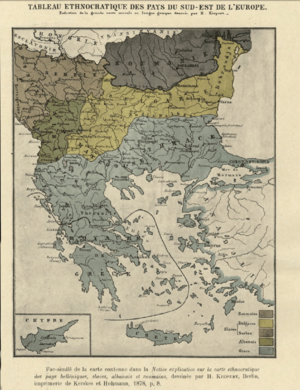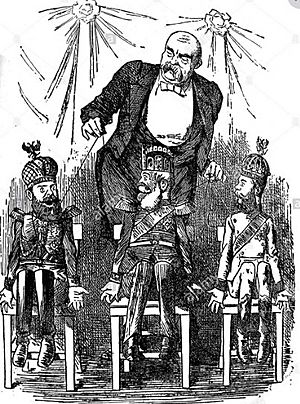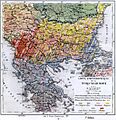Congress of Berlin facts for kids
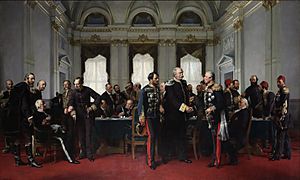
The Congress of Berlin was an important meeting held from June 13 to July 13, 1878. Its main goal was to reorganize the countries in the Balkan Peninsula. This was needed after the Russo-Turkish War of 1877–78, which Russia won against the Ottoman Empire.
Six major European powers attended: Russia, Great Britain, France, Austria-Hungary, Italy, and Germany. The Ottoman Empire was also there, along with four Balkan states: Greece, Serbia, Romania, and Montenegro. The meeting ended with the signing of the Treaty of Berlin. This new treaty replaced an earlier one called the Treaty of San Stefano.
The leader of the Congress was German Chancellor Otto von Bismarck. He wanted to make the Balkans more stable. He also aimed to reduce the Ottoman Empire's power in the region. Bismarck tried to balance the different interests of Britain, Russia, and Austria-Hungary. He also wanted to prevent Russia from controlling the Balkans. He did not want a very large Bulgaria to be formed. Keeping Constantinople under Ottoman control was another goal. Finally, Bismarck hoped to improve rights for Jewish people in the area.
Under Bismarck's influence, the Congress took away many European lands from the Ottomans. However, these lands were not given to Russia. The new country of Bulgaria was made much smaller than planned in the San Stefano treaty.
Instead, the affected areas gained different levels of independence. Romania became fully independent. But it had to give part of Bessarabia to Russia. It gained Northern Dobruja instead. Serbia and Montenegro also became fully independent. However, they lost some land. Austria-Hungary took control of the Sandžak region and Bosnia and Herzegovina. Britain gained Cyprus.
Some land stayed with the Ottoman Empire. Bulgaria became a semi-independent principality. Eastern Rumelia got a special administration. The region of Macedonia was returned to the Ottomans. This was on the condition that they would improve its government.
At first, people saw the results as a success for peace. But most countries were not fully happy. The Ottomans felt humiliated. Their weakness was clear, showing them as the "sick man of Europe". Russia felt it didn't get enough rewards, even though it won the war. Serbia, Bulgaria, and Greece all felt they deserved more land. Bulgaria, especially, got less than half the land it expected.
Bismarck became unpopular with Russian nationalists. He later realized that Germany had become too closely tied to Austria-Hungary in the Balkans. Austria-Hungary gained a lot of land. But this angered the South Slavs. It led to many years of tension in Bosnia and Herzegovina. This tension eventually led to the assassination of Archduke Franz Ferdinand.
In the long run, the Congress caused more tension between Russia and Austria-Hungary. It also led to arguments over nationalism in the Balkans. These problems grew until they exploded in the First and Second Balkan Wars (1912 and 1913). The continuing nationalism in the Balkans was one of the reasons for the First World War in 1914.
Contents
Why the Congress Happened
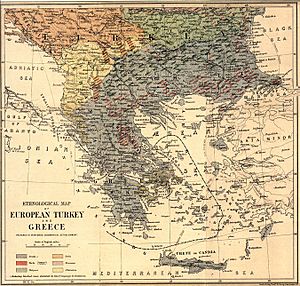
Before the Congress, a movement called Pan-Slavism was growing in Russia and the Balkans. This movement wanted to unite all Slavic people in the Balkans under one rule. The Treaty of San Stefano had created a "Greater Bulgaria". Many saw this as Russia trying to control southeastern Europe.
In Russia, Pan-Slavism meant creating a united Slavic state led by Russia. This would give Russia control of the Dardanelles and the Bosphorus straits. These straits connect the Black Sea to the Mediterranean Sea. This would give Russia great economic and political power. Other similar movements, like Pan-Germanism and Pan-Italianism, had already led to new unified countries.
Balkan Slavs felt they needed a strong state to lead their unification. They also needed a powerful country to support them, like France supported Italy. The recognition of the Bulgarian Exarchate by the Ottomans in 1870 was meant to separate Bulgarians from Greek religious leaders and from Serbia politically. Pan-Slavism required the end of Ottoman rule in the Balkans. The Congress of Berlin had to decide how this would happen.
Major Powers and the Balkans
The Balkans were a key area where European great powers competed in the late 1800s. Britain and Russia both cared about the region's future. Russia was interested because of Pan-Slavism and to gain control of the Mediterranean. Britain wanted to stop Russia from achieving these goals.
Also, the unification of Italy and Germany had limited Austria-Hungary's ability to expand. Germany, being the strongest country in Europe after the 1871 Franco-Prussian War, had less direct interest in the Balkans. This made Germany the only power that could fairly help solve the Balkan problem.
Russia and Austria-Hungary were the most interested in the Balkans. They were allies with Germany in the League of Three Emperors. This alliance aimed to protect the monarchies in Europe. So, the Congress of Berlin was mainly a disagreement among Bismarck's allies. Germany, as the mediator, had to choose which ally to support. This choice would affect Europe's future politics.
Ottoman cruelty during the Serbian–Ottoman War and the harsh stopping of the Herzegovina Uprising put pressure on Russia. Russia saw itself as the protector of the Serbs. It felt it had to act against the Ottoman Empire. Many Russians, including diplomats and ordinary people, felt sympathy for the Serbian Christians.
Russia eventually got Austria-Hungary to promise to stay neutral in the coming war. In return, Russia agreed to give Bosnia-Herzegovina to Austria-Hungary in the Budapest Convention of 1877. The Berlin Congress delayed the final decision on Bosnia. It left Bosnia and Herzegovina under Austria-Hungary's control. This was a goal for Hungarian Count Gyula Andrássy.
The Treaty of San Stefano
After the Bulgarian April Uprising in 1876 and Russia's victory in the Russo-Turkish War, Russia had freed almost all Ottoman lands in Europe. The Ottomans recognized Montenegro, Romania, and Serbia as independent. The lands of these three countries were also made larger. Russia created a large Principality of Bulgaria. This new state was autonomous but still under the Ottoman Sultan.
This expanded Russia's influence across the entire Balkans. This worried other European powers. Britain, which had threatened war if Russia occupied Constantinople, and France did not want another power interfering in the Mediterranean or the Middle East. Both Britain and France were planning to gain colonies there. Austria-Hungary wanted control over the Balkans. Germany wanted to prevent its allies from fighting.
German Chancellor Otto von Bismarck called the Congress of Berlin. He wanted to discuss how to divide the Ottoman Balkans among European powers. He also wanted to keep the League of Three Emperors strong.
The Congress was attended by Britain, Austria-Hungary, France, Germany, Italy, Russia, and the Ottoman Empire. Delegates from Greece, Romania, Serbia, and Montenegro attended sessions about their states. But they were not full members.
Russia's rivals, especially Austria-Hungary and Britain, asked for the Congress. Bismarck hosted it in 1878. The meetings were held at Bismarck's Reich Chancellery from June 13 to July 13, 1878. The Congress changed or removed 18 out of 29 articles from the Treaty of San Stefano. It also rearranged the East, building on earlier treaties like the Treaty of Paris (1856).
Other Powers Feared Russia
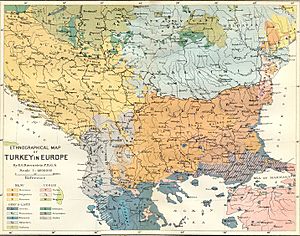
The main goal of the Congress was to stop the growing movement of pan-Slavism. This movement caused serious concern in Berlin and even more in Vienna. Vienna feared that Slavic groups would revolt against the Habsburgs (the ruling family of Austria-Hungary). The British and French governments were worried about the Ottoman Empire losing power. They also feared Russia's growing influence to the south. Both Britain and France planned to colonize Egypt and Palestine.
The Treaty of San Stefano, led by Russian Chancellor Alexander Gorchakov, had created an autonomous principality in Bulgaria. This new principality was under the Ottoman Empire's rule. This sparked the Great Game, which was Britain's great fear of Russia's growing influence in the Middle East.
The new Bulgaria included a large part of Macedonia. It also had access to the Aegean Sea. This could threaten the Dardanelles Straits, which connect the Black Sea to the Mediterranean Sea. This was not acceptable to the British. They saw the entire Mediterranean as their area of influence. Any Russian attempt to gain access there was a big threat to British power.
Before the Congress opened, British Prime Minister Lord Beaconsfield had already made a secret deal. This was the Cyprus Convention on June 4. It was an alliance with the Ottomans against Russia. Britain was allowed to occupy the island of Cyprus, which was in a key location. This agreement shaped Beaconsfield's position at the Congress. He even threatened war against Russia if it did not agree to Ottoman demands.
Negotiations between Austria-Hungary's Foreign Minister Gyula Andrássy and Britain's Foreign Secretary Marquess of Salisbury had also happened. By June 6, Britain agreed to all Austrian proposals about Bosnia-Herzegovina. In return, Austria would support British demands.
Bismarck as Host
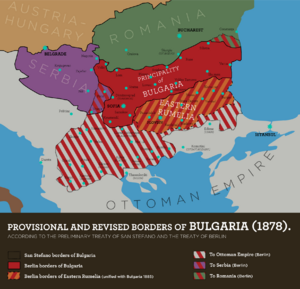
The Congress of Berlin is often seen as the peak of the rivalry between Chancellors Alexander Gorchakov of Russia and Otto von Bismarck of Germany. Both convinced other European leaders that a free Bulgaria would help reduce risks from the weakening Ottoman Empire. Historian Erich Eyck noted that Bismarck agreed with Russia. He believed that "Turkish rule over a Christian community (Bulgaria) was outdated." He said it caused revolts and bloodshed and should end. He used the Great Eastern Crisis of 1875 as proof of growing anger in the region.
Bismarck's main goal at the Congress was to keep Germany's strong position in the world. He did not want to break the League of the Three Emperors by choosing between Russia and Austria as an ally. To keep peace in Europe, Bismarck tried to convince other diplomats that dividing the Balkans would create more stability. During this process, Russia felt cheated, even though Bulgaria eventually gained independence. Problems in European alliances before the First World War became clear.
Bismarck was able to mediate the tensions at the Congress because of his diplomatic style. He sought peace and stability when international matters did not directly involve Germany. He saw the current situation in Europe as good for Germany. So, any conflicts between major European powers that threatened this balance were against German interests. Also, at the Congress, "Germany could not gain any advantage from the crisis" that began in the Balkans in 1875. Therefore, Bismarck claimed Germany was neutral. This allowed him to lead the talks and watch for unfair actions.
Most of Europe expected a grand diplomatic event, like the Congress of Vienna. But they were disappointed. Bismarck, unhappy to be holding the Congress in the summer heat, had a short temper. He had little patience for pointless speeches. So, any showboating was quickly stopped by the German chancellor. The representatives from the small Balkan territories, whose future was being decided, were barely allowed to attend the meetings. These meetings were mainly between the representatives of the great powers.
According to Henry Kissinger, the Congress marked a change in Bismarck's Realpolitik (practical politics). Before, Germany was too powerful to be isolated. His policy was to keep the League of the Three Emperors. Now, he could no longer fully rely on Russia's alliance. So, he started to build relationships with as many potential enemies as possible.
What Happened Next
Following Russia's pressure, Romania, Serbia, and Montenegro were all declared independent principalities. Russia kept Southern Bessarabia, which it had taken in the Russo-Turkish War. But the Bulgarian state it created was first cut in half. Then it was divided again into the Principality of Bulgaria and Eastern Rumelia. Both were given some autonomy, but still under the Ottoman Empire. Bulgaria was promised self-rule and protection from Turkish interference. But these promises were largely ignored.
Romania received Northern Dobruja. Montenegro gained Nikšić, along with the main Albanian areas of Podgorica, Bar, and Plav-Gusinje. The Ottoman government agreed to follow rules from 1868. It also promised to protect the civil rights of non-Muslim people.
The region of Bosnia-Herzegovina was given to Austria-Hungary to manage. Austria-Hungary also got the right to keep soldiers in the Sanjak of Novi Pazar. This was a small border region between Montenegro and Serbia. The Sanjak kept Serbia and Montenegro separated. The Austrian-Hungarian soldiers there could open a path towards Salonika. This would bring the western Balkans under Austrian influence. Bosnia and Herzegovina were set for eventual annexation by Austria-Hungary.
Russia agreed that Macedonia, a very important area in the Balkans, had too many different groups of people to be part of Bulgaria. So, it was allowed to stay under the Ottoman Empire. Eastern Rumelia, which had many Turkish and Greek minorities, became an autonomous province. It had a Christian ruler and its capital at Philippopolis. The rest of the original "Greater Bulgaria" became the new state of Bulgaria.
In Russia, the Congress of Berlin was seen as a big failure. After finally defeating the Turks, many Russians expected "something huge." They hoped for a new map of the Balkans that would support Russia's land goals. Instead, their victory led to Austria-Hungary gaining land in the Balkans. This happened because other European powers preferred a strong Austria-Hungary, which threatened almost no one. They did not want a powerful Russia, which had been competing with Britain for much of the century. Russian diplomat Gorchakov said, "I consider the Berlin Treaty the darkest page in my life." Most Russians were angry that Europe rejected their gains. While some thought it was just a small setback for Russian power in the Balkans, it actually gave Bosnia-Herzegovina and Serbia to Austria-Hungary's influence. It basically removed all Russian influence from the area.
The Serbs were upset that "Russia... consented to Bosnia being given to Austria." Jovan Ristić, Serbia's delegate at Berlin, asked a Russian delegate what comfort remained for the Serbs. The Russian replied that it was the thought that "the situation was only temporary because within fifteen years at the latest we shall be forced to fight Austria." Ristić called this "Vain consolation!"
Italy was also unhappy with the results. Tensions between Greece and the Ottoman Empire were not solved. Bosnia-Herzegovina would also cause problems for Austria-Hungary in later years. The League of the Three Emperors, formed in 1873, broke apart. Russia saw Germany's lack of support for Bulgaria's full independence as a betrayal. The border between Greece and Turkey was not settled. In 1881, after long talks, a compromise border was accepted. This happened after a naval show of force by the great powers. It resulted in Thessaly and the Arta Prefecture being given to Greece.
So, the Berlin Congress created problems that led to future conflicts. These included the Balkan Wars and eventually the First World War. In 1954, British historian A. J. P. Taylor wrote that if the Treaty of San Stefano had stayed, both the Ottoman Empire and Austria-Hungary might still exist today.
Even though the Congress of Berlin was a big blow to Pan-Slavism, it did not solve the region's problems. The Slavic people in the Balkans were still mostly under non-Slavic rule. They were split between Austria-Hungary and the weakening Ottoman Empire. The Slavic states learned that working together as Slavs helped them less than playing to the wishes of a powerful neighbor. This hurt the unity of the Balkan Slavs and encouraged competition among the new Slavic states.
The hidden tensions in the region continued for thirty years. They exploded again in the Balkan Wars of 1912–1913. In 1914, the assassination of Franz Ferdinand, the heir to Austria-Hungary, led to the First World War. Looking back, the goal of keeping peace and balance of power in the Balkans clearly failed. The region remained a source of conflict for the great powers well into the 20th century.
Images for kids
-
Map of the ethnic composition of the Balkans in 1877 by A. Synvet, a French professor.
-
An image showing Bulgaria's autonomy after the Treaty of Berlin.
Lithograph by Nikolai Pavlovich
Delegates at the Congress
- Benjamin Disraeli (Prime Minister)
- Marquess of Salisbury (Foreign Secretary)
- Baron Ampthill (Ambassador to Germany)
- Prince Gorchakov (Foreign Minister)
- Count Shuvalov (Ambassador to Great Britain)
- Baron d'Oubril (Ambassador to Germany)
- Otto von Bismarck (Chancellor)
- Prince Hohenlohe (Ambassador to France)
- Bernhard Ernst von Bülow (State Secretary for Foreign Affairs)
- Count Andrássy (Foreign Minister)
- Count Károlyi (Ambassador to Germany)
- Baron Heinrich Karl von Haymerle (Ambassador to Italy)
- Monsieur Waddington (Foreign Minister)
- Comte de Saint-Vallier
- Monsieur Desprey
- Count Corti (Foreign Minister)
- Count De Launay
- Karatheodori Pasha
- Sadullah Pasha
- Mehmed Ali Pasha
- Catholicos Mkrtich Khrimian (representing Armenian population)
- Theodoros Deligiannis
- Jovan Ristić
- Božo Petrović
- Stanko Radonjić
- Abdyl Frasheri
- Jani Vreto
See also
 In Spanish: Congreso de Berlín para niños
In Spanish: Congreso de Berlín para niños
 | Madam C. J. Walker |
 | Janet Emerson Bashen |
 | Annie Turnbo Malone |
 | Maggie L. Walker |


